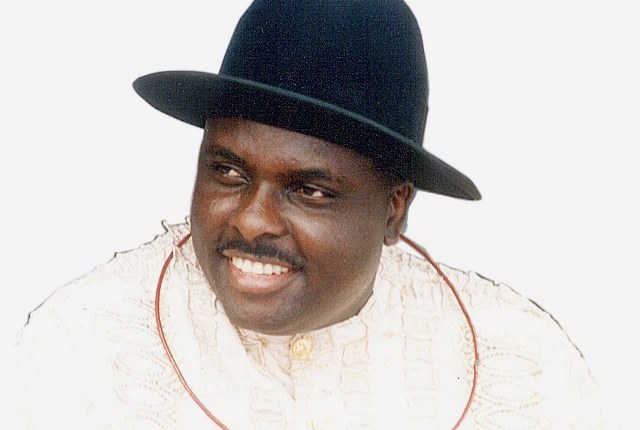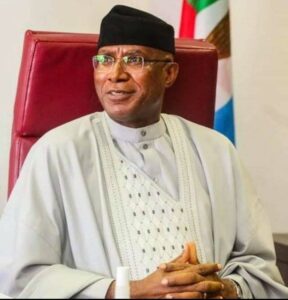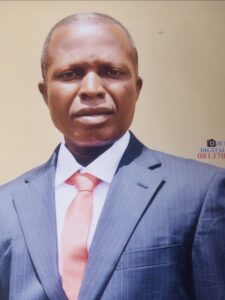JAMES IBORI ON THE NEWS AGAIN, WITH HIS LOSS FOR AN APPEAL AGAINST HIS CONVICTION IN UK
With regards to recent report that former Governor of Delta State, James Ibori, who was jailed in Britain for laundering tens of millions of dollars in stolen public funds belonging to Delta State, through British banks and property, has lost an appeal against his London conviction, while we are not surprised with the said ruling, for us, we really do not see the need for the said appeal by Ibori in the first place. We recall when in 2016, Ibori appealed against his conviction called for an independent investigation, but we wondered of what essence is the said appeal by Ibori over a corruption case he willingly admitted and pleaded guilty to have committed against Delta State and its people. We wondered how can Ibori be asking for an independent investigation to be carried out over his conviction, when in fact he was the one who pleaded guilty to have committed the crime in the first place? And must importantly, we wonder why Ibori cannot simply swallow his pride, admit his mistakes, turn a new leaf and live a very low-profile life out of public glare?
Let us recall that James Ibori pleaded guilty, on Monday (20/02/2012) to charges of money-laundering involving sums amounting to at least 50 million pounds ($66 million), and conspiracy to defraud Delta State, in a South Wark Crown Court, UK, while facing a 10 – count charge brought against him by the British Metropolitan Police. “The prosecuting Queen Counsel, Sasha Wass, had said then that Ibori, had “tricked” his way into becoming a Governor between 1999 and 2007, by giving false date of birth and claiming he had no criminal record. “He was never the legitimate governor and there was effectively a thief in government house. As the pretender of that public office, he was able to plunder Delta State’s wealth and hand out patronage,” said Wass. It is worthy to note too that before the development of Ibori’s guilty plea, his wife, Theresa, Nkoye Ibori, his sister, Christine Ibie; his mistress, Udoamaka Okoronkwo, had all been convicted of money – laundering and sentenced to various jail terms each. While Ibori got a 13-year jail sentence for which he served half of the term, as is common in the British system and is now back in Nigeria.
Anti-corruption campaigners have already commended the ruling as a milestone for Nigeria, where no politician of Ibori’s stature had been successfully prosecuted, and for Britain, long seen as too complacent on the proceeds of corruption being laundered through the UK. the said ruling will allow Britain to resume efforts to confiscate millions of pounds’ worth of assets and return them to Nigeria’s coffers. The assets have been frozen for years, while the case has been dragging in the courts. Despite his guilty pleas, Ibori appealed against his conviction, alleging that one of the British police officers, who investigated him (Ibori) had collected bribes from a private detective in return for tips on the probe, but the indicted officer had denied the claims. Ibori had also alleged that British prosecutors had covered up the corruption case, tainting the judicial process, allegations that had threatened to turn the case into a major embarrassment for the British authorities. But three senior appeal judges said the bribery claims have no evidence, insisting that if it happened, Ibori himself had instigated it, as the private detective was working for him.
The truth is that, people do not plead guilty for the crimes they did not commit. You only plead guilty, when the evidences brought against you have overwhelmingly proved you committed the crime, and as such, the “guilty plea” becomes the next line of action. Obviously, Ibori willingly admitted to have committed the corruption charges leveled against him because he actually did commit the crime, and even far worse. So, no matter his ‘appeal stunts’, it does not in any way exonerate or suggest that Ibori’s trial and conviction was flawed or not properly conducted. It does not suggest that Ibori’s famous ‘guilty plea’ did not happen or was he coerced or forced in any way to admit he committed the crime. But everyone can now rest that this latest judgement has laid that to rest. More so, we do not think Ibori has the audacity or moral standing to even come forth to boldly make any appeal against his conviction in the first place. What is Ibori hoping that to achieve with the said appeal of his conviction – that the corruption atrocities he committed against Delta State and its people did not happen? Or what exactly?
This is the problem we have with most Nigerian past and present Political leaders at all levels of Government. Rather than ‘hide in shame’ or show a little bit of remorse or repentance for the corruption atrocities they must have committed while in Office, especially when they have such corruption charges hanging on their neck; they still have the audacity and impetus to carry themselves about and throttle around public domain as if nothing happened. That is the same ‘ridiculous attitude’ Ibori is trying to exhibit. The saddest part is that the people, whose collective wealth was stolen by Ibori, still praise, honour and even worship him wherever his goes, since he came back to Nigeria.
For a Nigerian politician like James Ibori, who had served two terms (of Eight years) in Office as Governor of Delta State; had introduced his daughter, Ms Erhiatake (‘Take) Ibori into politics as a first-time (and youngest) member of the Delta State House of Assembly who stunned political analysts when she emerged as the Chairman of the influential House Committee on Finance and Appropriation; had wielded enormous influence in the last decade and determined, to a large extent, who gets what, when and how in the oil-rich State – what more could Ibori be looking for? We believe what is left for James Ibori now is to ‘remain silent’ and be an ‘elder statesman’ at the background. As one who simply contributes to his Community’s growth and development, as a Community Leader of Oghara Kingdom. This was the advice given to Ibori by Abraham Ogbodo of The Guardian newspaper, some time ago after Ibori’s release from prison. It is that same advice that we giving to Ibori to heed.
Zik Gbemre.
National Coordinator
Niger Delta Peace Coalition (NDPC)




